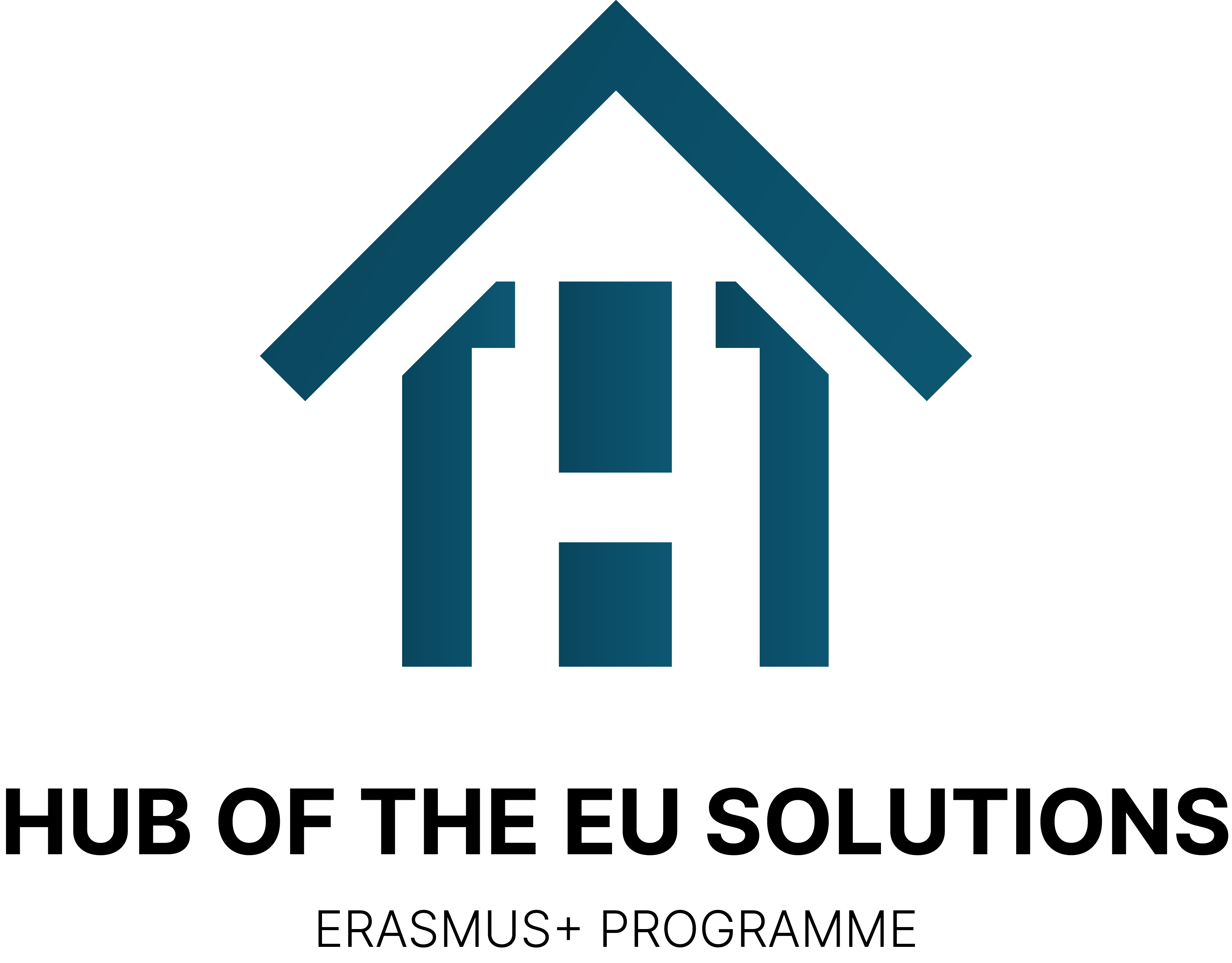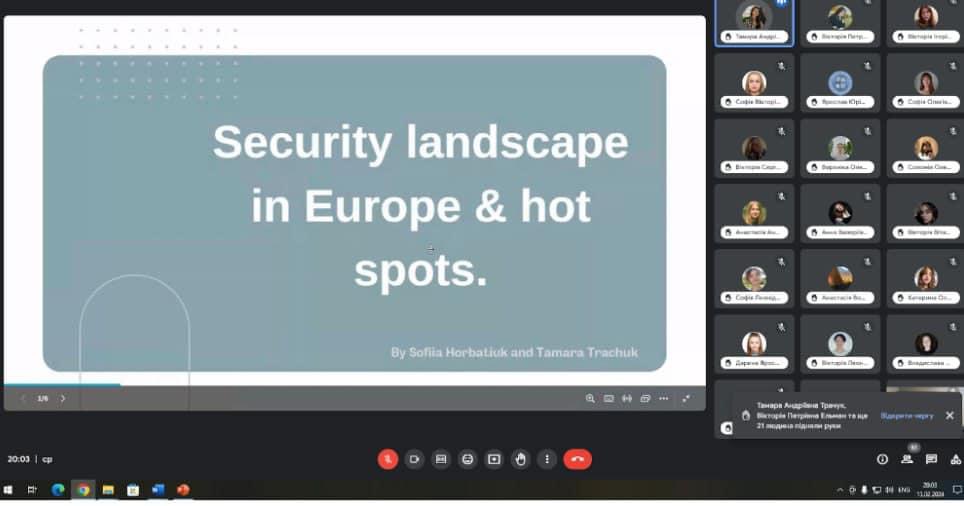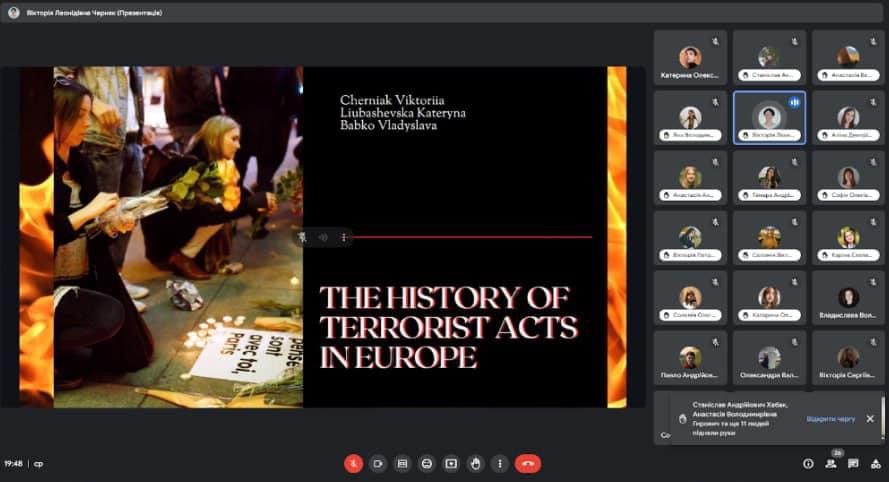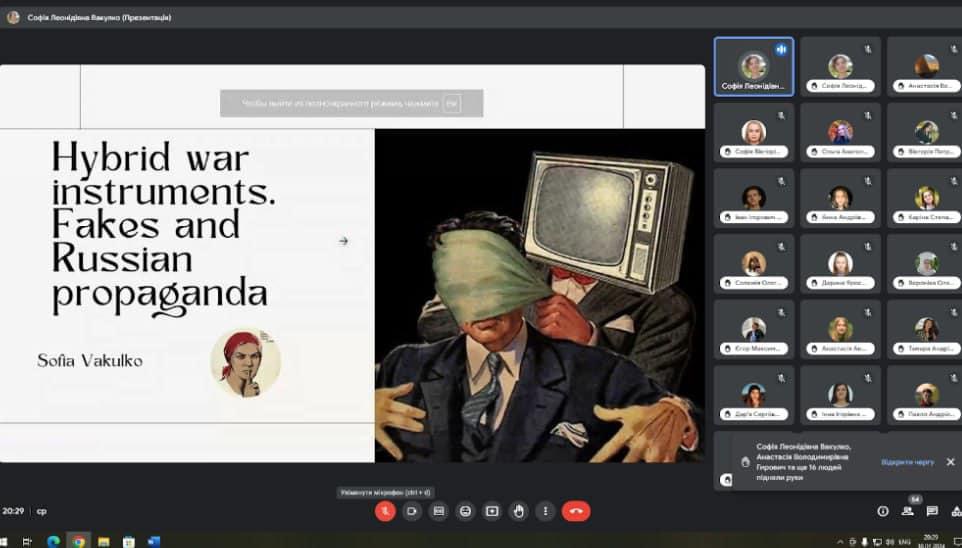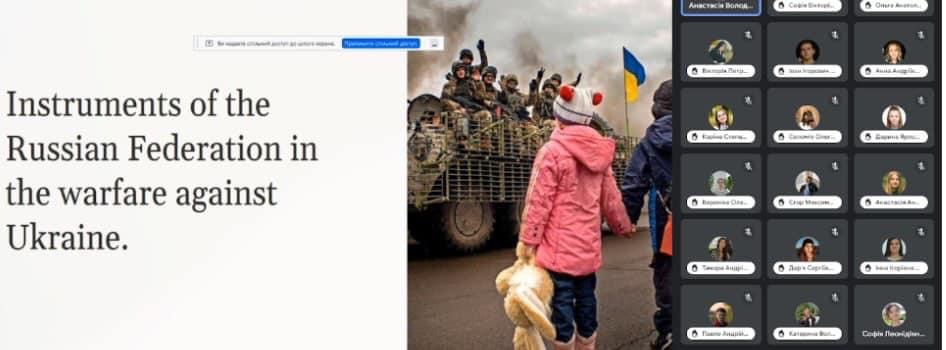As part of the grant project Hub of the EU solutions, the educational certificate course “Modern Challenges: Security and the EU” has been actively launched for the semester.
Despite global statistics indicating increased security, Europe is experiencing a growing sense of insecurity. Over the past decade, significant changes have occurred in the European security environment. The technological revolution is affecting all aspects of life, reshaping the global understanding of security, conflict, and warfare.
The media landscape is transforming, and network interactions are reaching unprecedented complexity. This course, designed for Ukrainian students, provides a deep understanding of the multidisciplinary study of modern challenges and EU security issues, uncovering the vision of hybrid conflicts and hybrid warfare. In addition, we focus on global challenges for the EU in military, political, and social spheres.
The course covers changes in the security environment, explains the mechanisms of security threats (in areas such as critical infrastructure, disinformation, radicalization, violent extremism, and terrorism), and the EU’s response to these challenges. The goal of the course is to identify and explore national, regional, and collective security requirements and capabilities to support a comprehensive approach to countering security threats.
The course provides an analysis of the following issues:
Course Topics
- Modern Security Challenges in the EU: Conceptual Framework of Contemporary Threats and Challenges.
- EU Security Approaches: Evolution of Security Issues and Challenges.
- Modern Global and Transregional Threats: The Role of the EU in Conflict Prevention and Peacebuilding – Four Key Challenges.
- The EU Security Landscape and Hotspots.
- Energy Security: The War in Ukraine and the Energy Crisis.
- The Migration Crisis in the EU.
- The European Union’s Relations with Russia.
- Terrorism and EU Security: Counterterrorism Policy and Tools.
- EU Security Issues and Hybrid Threats.
- Information Security: Principles and Information Security Policy.
- Rules and Principles of Protection: Data Protection Laws in the EU (GDPR).
- Conventional and Hybrid Warfare: The Concept of Hybrid War.
- Global Terrorism and EU Security: The EU’s Response to Terrorism and Counterterrorism Tools. European Counterterrorism Policy.
- European Cooperation in Security and Defense: EU-NATO and Eastern Partnership Countries. NATO-EU-Ukraine Cooperation in Combating Security Threats (including Hybrid Threats).
- Ukraine as an Integral Part of the Modern European Security Architecture.
- Joint Framework for Combating Hybrid Threats: NATO’s Response to Hybrid Threats.
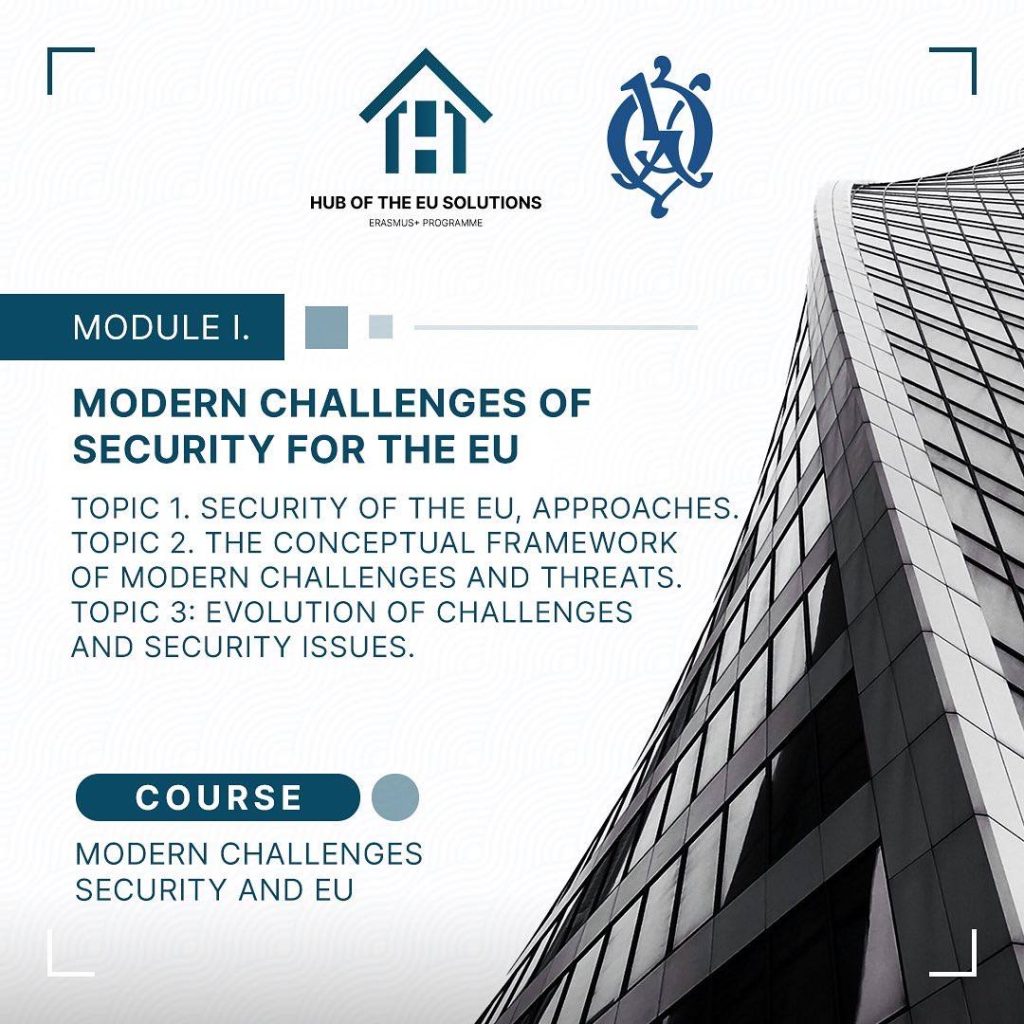
Module І
Modern Challenges of Security for the EU
TOPIC 1. SECURITY OF THE EU, APPROACHES.
TOPIC 2. THE CONCEPTUAL FRAMEWORK OF MODERN CHALLENGES AND THREATS.
TOPIC 3: EVOLUTION OF CHALLENGES AND SECURITY ISSUES.
Module ІІ
Conflicts and the EU
TOPIC 1. CURRENT GLOBAL AND TRANSREGIONAL THREATS.
TOPIC 2. SECURITY LANDSCAPE IN EUROPE & HOT SPOTS.
TOPIC 3: THE EU’S ROLE IN CONFLICT PREVENTION AND PEACEBUILDING: FOUR KEY CHALLENGES.
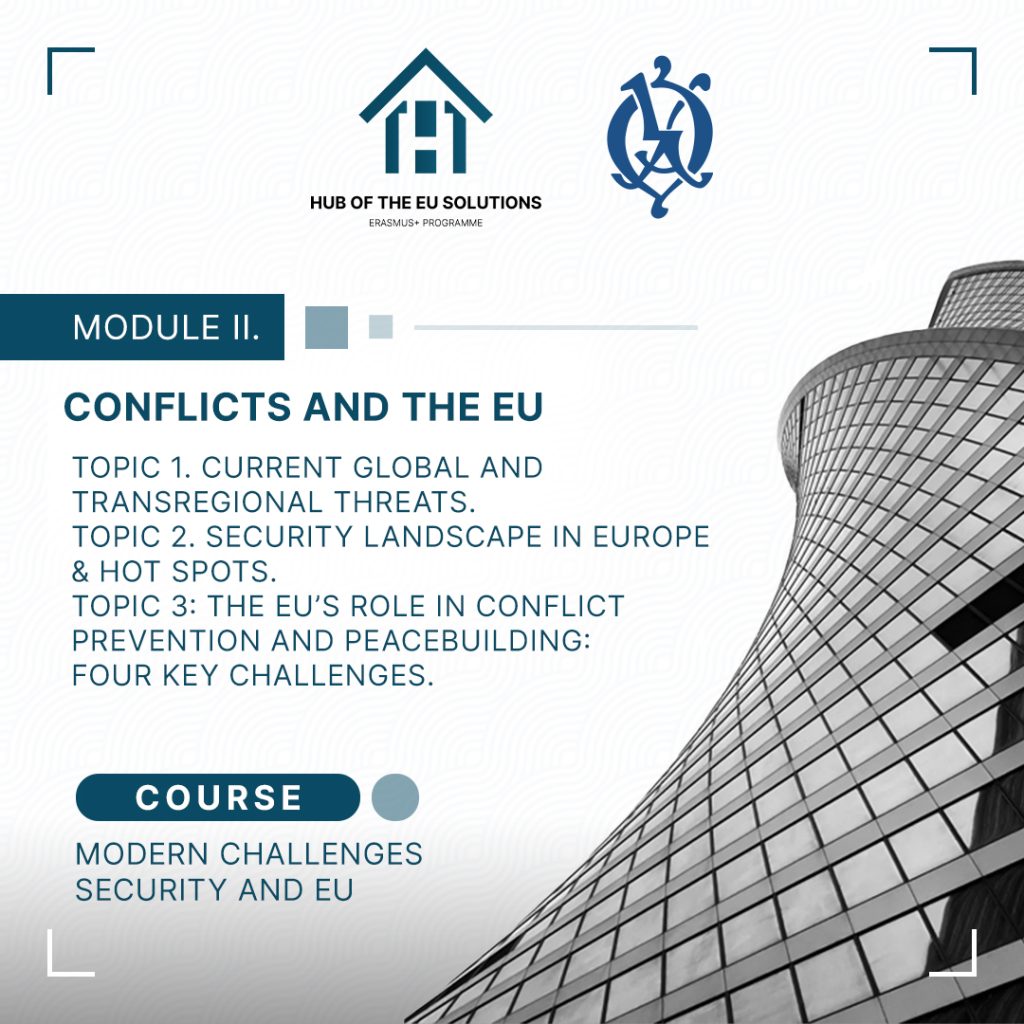
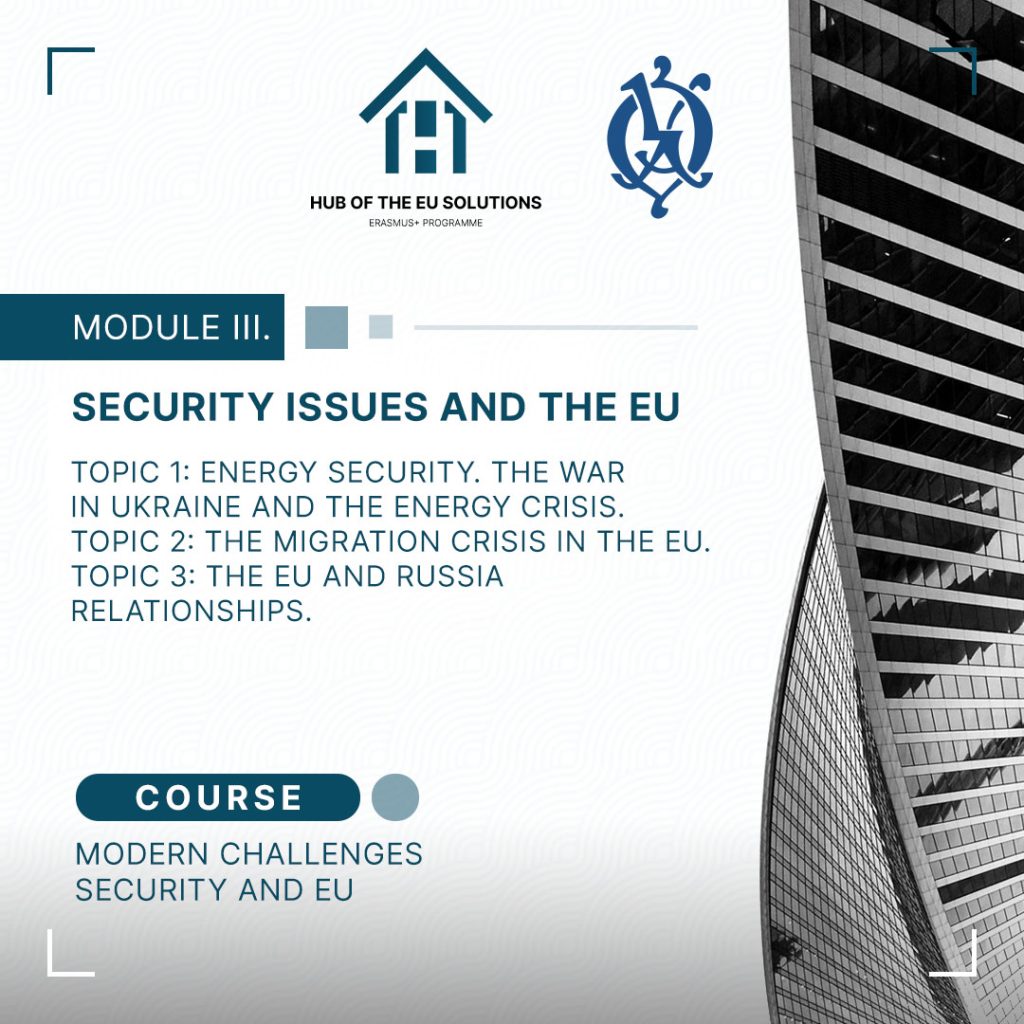
Module III
Security issues and the EU
TOPIC 1: ENERGY SECURITY. THE WAR IN UKRAINE AND THE ENERGY CRISIS.
TOPIC 2: THE MIGRATION CRISIS IN THE EU.
TOPIC 3: THE EU AND RUSSIA RELATIONSHIPS.
Module IV
Conventional vs hybrid warfare
TOPIC 1. THE CONCEPT OF HYBRID WAR, APPROACHES AND MEANINGS.
TOPIC 2: CONVENTIONAL VS HYBRID WAR.
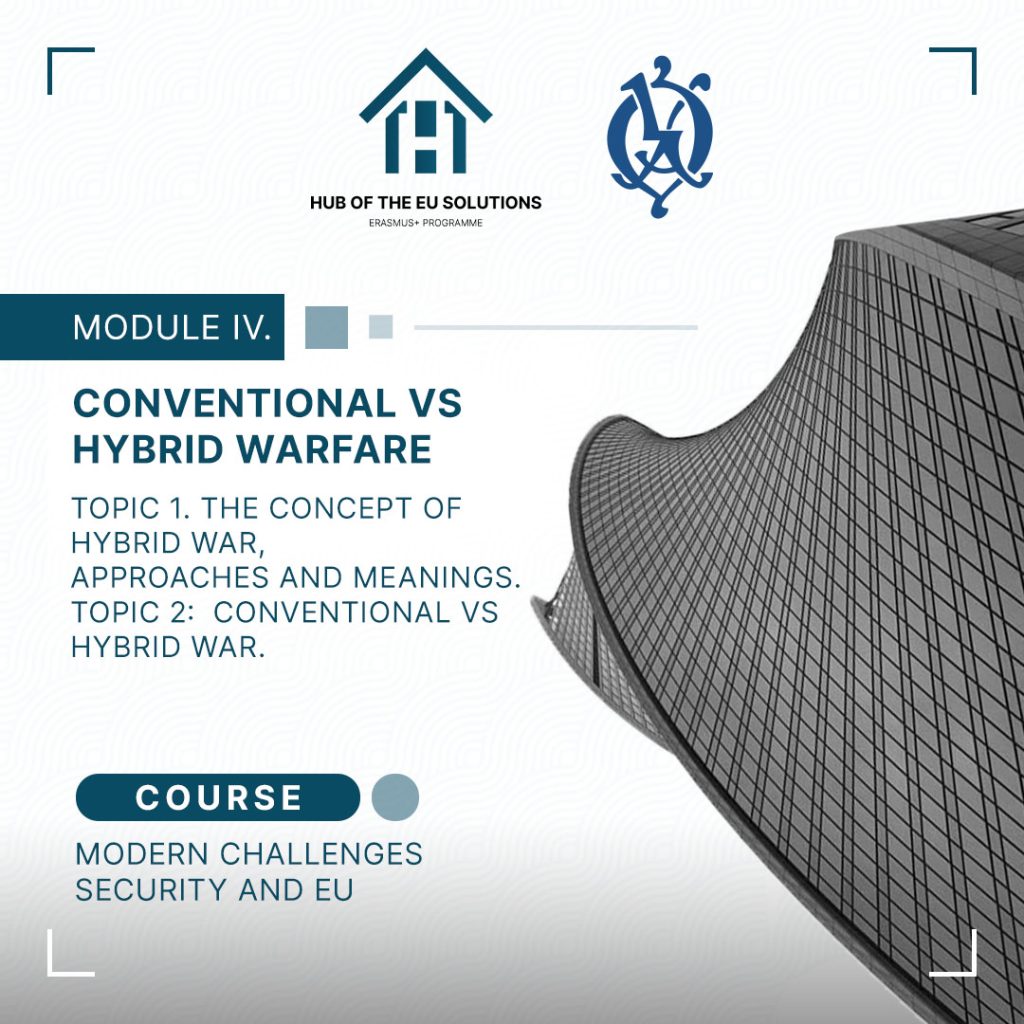
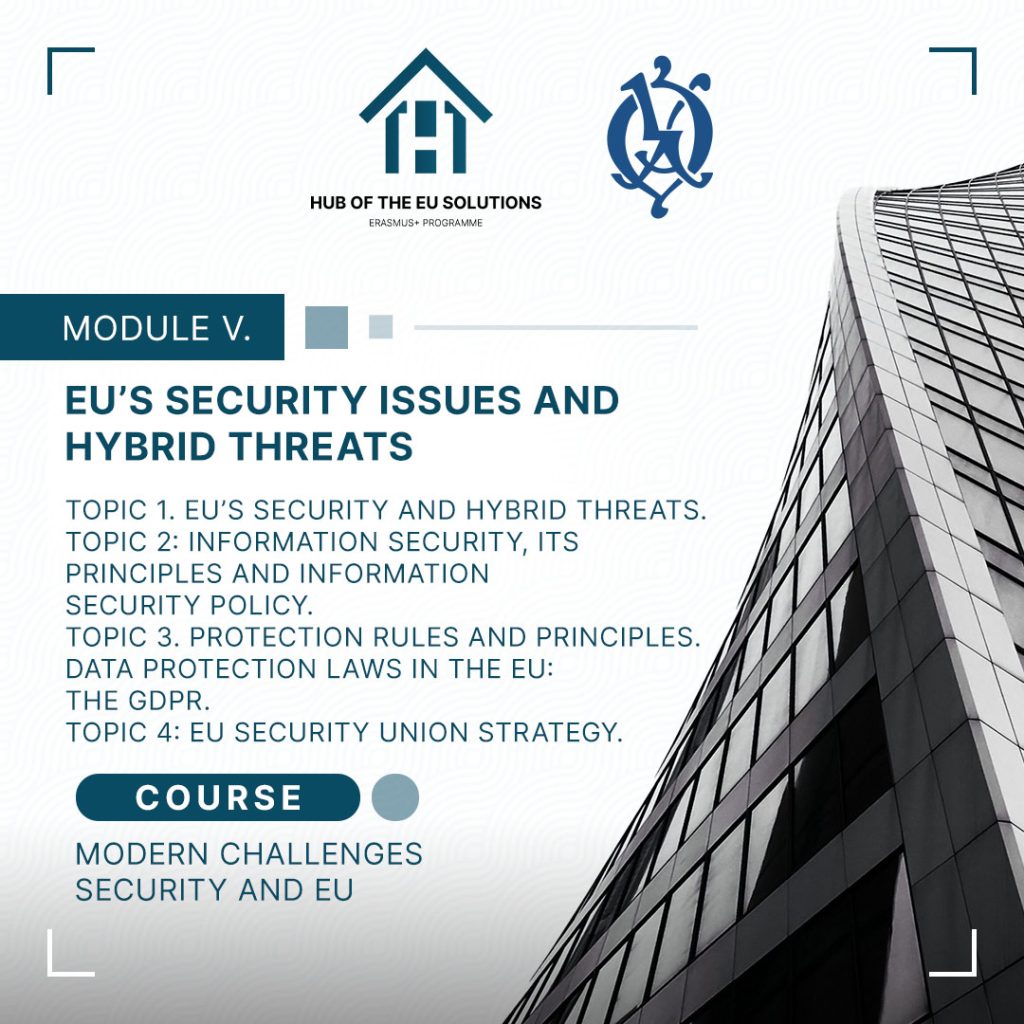
Module V
EU’s security issues and hybrid threats
TOPIC 1. EU’S SECURITY AND HYBRID THREATS.
TOPIC 2: INFORMATION SECURITY, ITS PRINCIPLES AND INFORMATION
SECURITY POLICY.
TOPIC 3. PROTECTION RULES AND PRINCIPLES.
DATA PROTECTION LAWS IN THE EU:
THE GDPR.
TOPIC 4: EU SECURITY UNION STRATEGY.
Module VI
Global terrorism and security of the EU
TOPIC 1: TERRORISM AND SECURITY OF THE EU.
TOPIC 2. THE EU RESPONSE TO TERRORISM.
COUNTER-TERRORISM INSTRUMENTS.
TOPIC 3: EUROPEAN ANTI-TERRORISM POLICY.
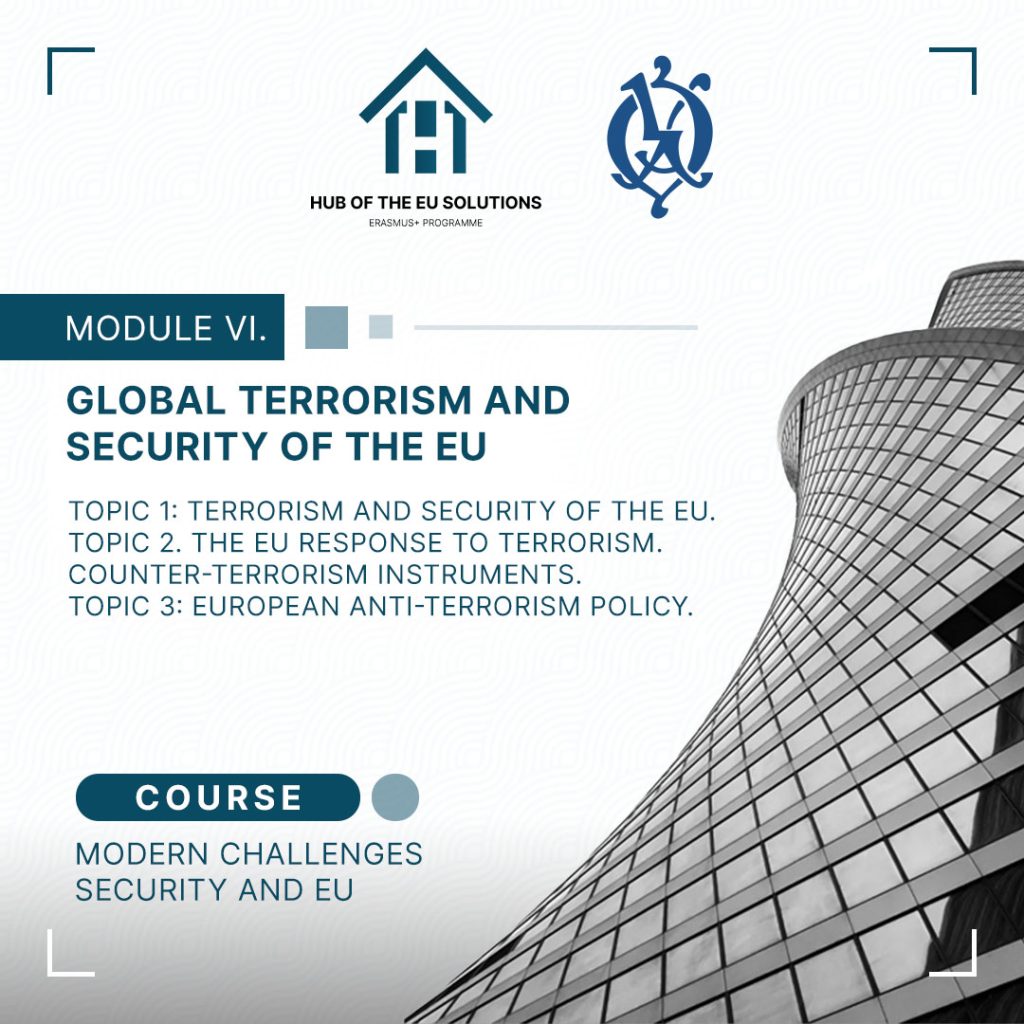
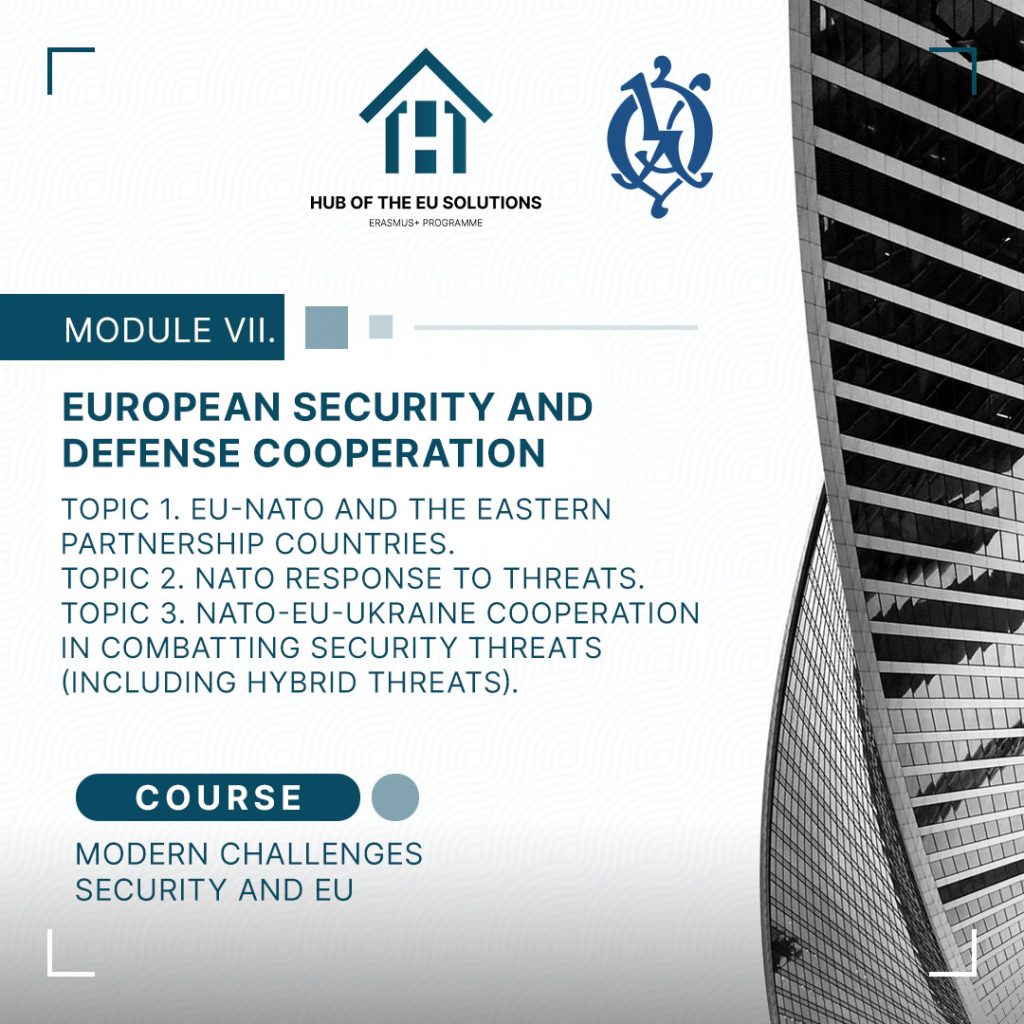
Module VII
European security and defense cooperation
TOPIC 1. EU-NATO AND THE EASTERN PARTNERSHIP COUNTRIES.
TOPIC 2. NATO RESPONSE TO THREATS.
TOPIC 3. NATO-EU-UKRAINE COOPERATION IN COMBATTING SECURITY THREATS (INCLUDING HYBRID THREATS).
Module VIII
Ukraine as an integral part of modern European security architecture
TOPIC 1: UKRAINE’S CRISIS – EVOLVING EUROPEAN SECURITY ARCHITECTURE.
TOPIC 2: THE ROLE OF UKRAINE IN EUROPEAN SECURITY ARCHITECTURE. PERSPECTIVES AND FUTURE OF THE EU.
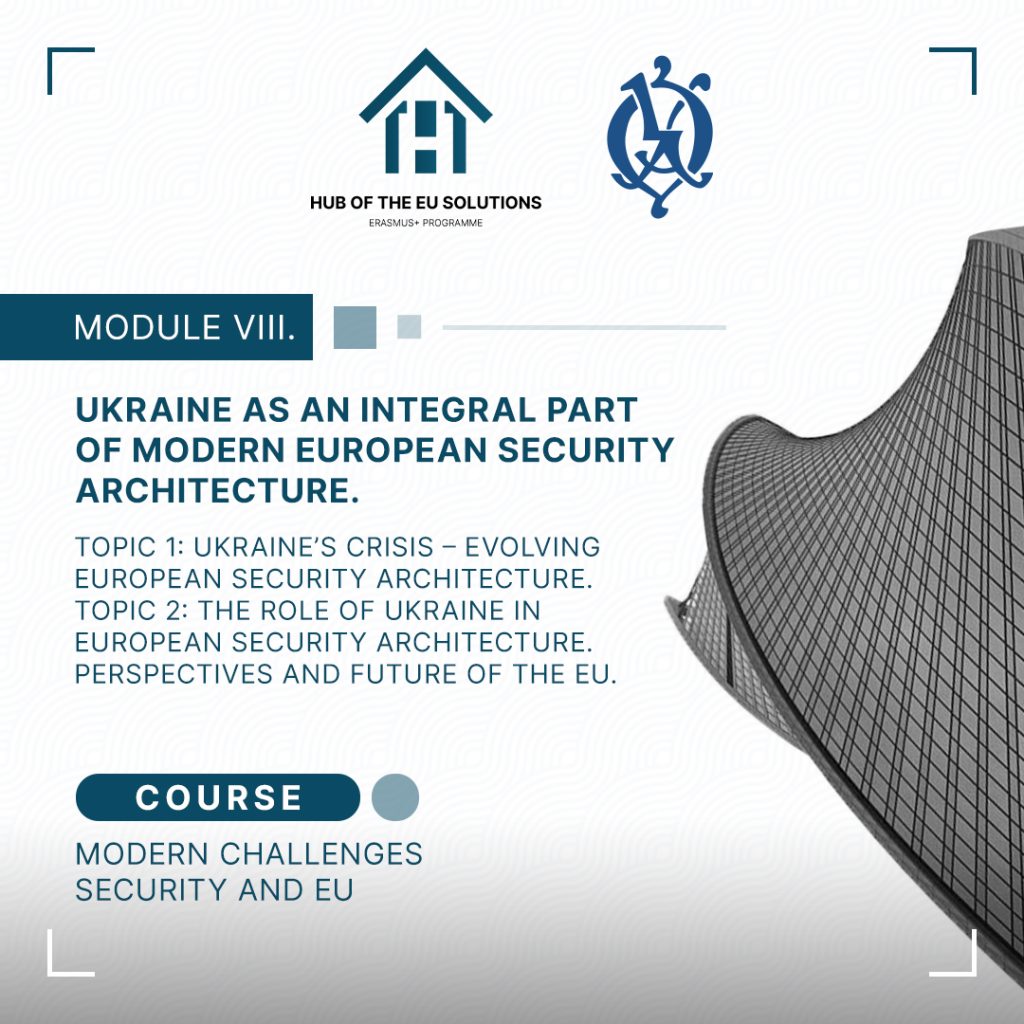
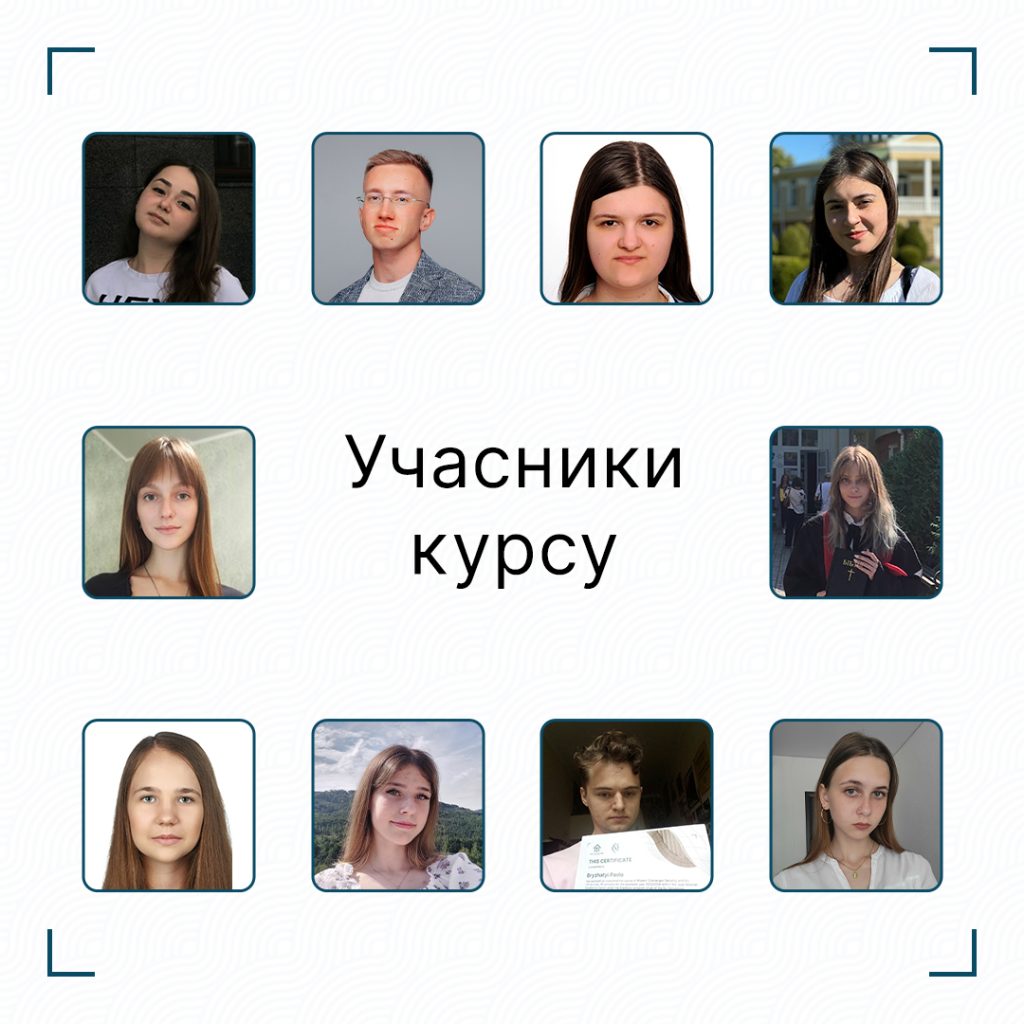
Course Participants
Approximately 70 students from the Educational and Scientific Institute of Linguistics and the Educational and Scientific Institute of International Relations and National Security participated in this course.
The course instructor, Anatoliy Khudoliy, noted: “The main idea of the course is to study the theoretical foundations and develop students’ practical skills in the field of modern challenges and European security.”
Additionally, the course was taught by Olha Balatska, Tetyana Sydoruk, as well as invited international lecturers.
In conclusion, the students received certificates for completing the course “Modern Challenges: Security and the EU.”
Screenshots:
Feedback:
“Thanks to this course, I was able to improve my knowledge of the geopolitical situation, which is incredibly useful for anyone, regardless of their specialty. What I liked the most was working with English articles and diverse vocabulary, as well as the lectures by foreign speakers. Thank you for this course!”v
“EVERYTHING. Besides learning useful and interesting information, I expanded my vocabulary, overcame my fear of starting something new, and found comfort in creating presentations for seminars. Overall, the course became my quality time, a way to spend the evening productively. Moreover, the course had a friendly atmosphere. Even my mom would come to listen to the lectures.”
“I found this course valuable because I expanded my vocabulary in both English and Ukrainian, and deepened my knowledge of politics. This course also helped me become more informed about current global issues. What I liked the most was not just absorbing theoretical material but exchanging thoughts with my colleagues and peers, hearing different perspectives. It was heartening to see how many engaged, curious, and active young people we have. I was especially delighted to listen to the invited lecturers, particularly Ms. Narine Ghazaryan from a foreign university. This experience not only provided fresh perspectives but also made us feel recognized on the international stage.”
“As a participant in the certificate program, I was able to improve my English skills and learn more about the modern challenges facing the EU and the world. I liked how the topics were chosen, and the course sparked my interest in the EU, politics, and international relations. I was especially intrigued by the topic of hybrid warfare and the importance of understanding its manifestations. While preparing for seminars, I was able to delve deeper into the selected topics and present them through presentations. I can confidently say that participating in this certificate program was both beneficial and valuable.”
“I enjoyed the translation aspect the most—it was my primary goal to improve my ability to translate more complex vocabulary than I was used to. Additionally, I became more familiar with political topics, which I now consider essential. I now have a much better understanding of all the processes involved in Ukraine’s accession to NATO and the EU. I have weighed the pros and cons, read various articles, evaluated the opinions of influential publications and individuals, and now have a clearer picture of the steps we are expected to take to reach our goal. I also greatly enjoyed listening to lecturers from different faculties—this was an invaluable experience.”
“The certificate program was quite interesting for me, as it was my first time participating in such a course. I enjoyed listening to the lectures and seminars in English, which helped me practice my listening skills in English and expand my vocabulary. I liked preparing presentations for seminars and analyzing the articles provided by the lecturer. Thanks to the certificate program, I learned a lot about political processes outside of Ukraine, which is essential for understanding the sentiments of our foreign partners. Overall, I am happy I joined the program, as I gained a lot of new knowledge and spent my time productively. I would love to join a similar course in the future.”
“Personally, I liked the part with Professor Khudoliy the most because we had the opportunity to develop our translation skills. That section was also the clearest to me.”
“I really enjoyed all three sections. I especially liked the lectures by Tetyana Vitaliivna Sydoruk. The time flew by effortlessly during her lectures.”
“The lectures on unusual topics, such as the EU’s ‘green’ policies in Ms. Balatska’s section, and the live article translation sessions in Mr. Khudoliy’s section, were a highlight for me.”
“I liked everything, from the topics of the meetings to the organization. Everything was structured and engaging. This course is not only about theory but also about practice, which is very important and valuable.”

